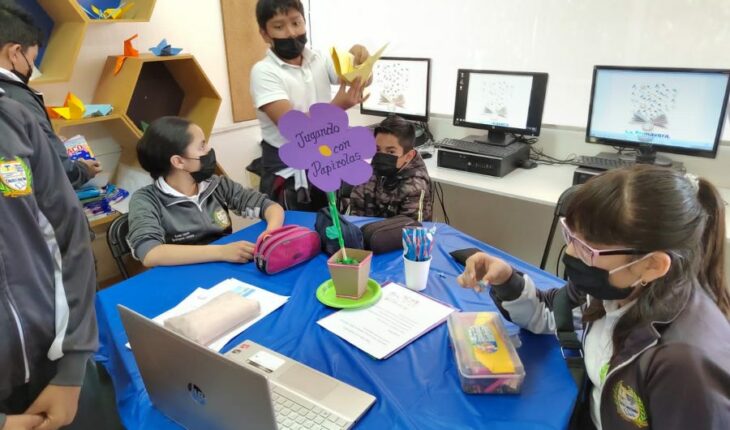Since 2007, when the Full-Time Schools program was launched as a pilot test in 441 schools in the country, the Ernesto Corona Amador elementary school located in Guadalajara, Jalisco, had been benefited uninterruptedly until last year when the Federal Government decided to eliminate it. Faced with anger and frustration that the students could not continue with their extended classes and food service, parents organized to assume the cost and maintain the program. Not everyone can afford it, sometimes they are delayed, but among the whole community they have managed to maintain it.
You may be interested: False that Full-Time School benefits are retained with the direct delivery program
The initiative began in this school through a model that contemplates a fixed fee of 150 pesos per week per student with which the dining service is paid and the payment is covered to the teachers who agreed to participate and teach until 4:00 p.m. In chats of teachers and parents the word spread and currently there are nine schools in Jalisco who have implemented this strategy for the benefit of 2,190 students.
“You touched me the most delicate, you didn’t touch my pocket, you touched my child. Authority, use your head, I don’t care what name you give the program. If political fashion says that today is ‘Welfare’, put ‘Welfare of children’, but give me the resources I occupy, support me with the resources that were already established because you are doing economic damage to the parents of these communities very strong, “said Sergio Daniel García father of a student who is in the sixth grade in this school.
In an interview, the man explained that since years ago -and in accordance with the rules of operation of the program- in his campus, like others, a cooperation of 30-50 pesos was made because the Full-Time Schools did not receive all the resources and supplies that were required to prepare the food of the students since this depended on the area in which the campus will be located and the needs that each one of them had.
It was a support that was given when it was necessary and that the community assumed according to its possibilities, but after the disappearance of the program and although there are nine schools that maintain the benefits, families do not always have the necessary resources to pay the expense each week.
“We have always participated but right now they make us look like ‘if you want, then cooperate’, and yes, we are doing it but do not go to misinterpret that we cooperate and that they say ‘follow him, they already grabbed the little path, follow him’, that would be very serious,” added the father of the family.
Previously, for example, this school received- as part of the Full-Time Schools program – an endowment of non-perishable products and parents contributed minimum amounts to buy other supplies. In the case of schools benefited and located in communities of high marginalization, they permanently received perishable and non-perishable products to guarantee the feeding of the students.
“It’s not just the will of parents and teachers”
Flavio Mendoza, director of the Ernesto Corona Amador elementary school, in Guadalajara, Jalisco, explains that since 2019 he was afraid that the Full-Time Schools program could disappear because, contrary to what the General Education Law mandates that year after year the schools benefited from the program should have a budget increase, this was not being fulfilled and on the contrary, in 2020 there was a decrease of 50% going from 10 thousand 189 to 5 thousand 100 million pesos.
However, already in 2021, when it was decided that the program would be added to the School is Our strategy that aims at the physical intervention of school campuses, and in 2022 not a single weight was assigned to Full-Time Schools, he was certain that they would disappear so it was necessary to act and let the authorities know the damage they would cause by eliminating the program. which, he says, had brought positive results to the students. “It is one of the most successful programs in the last 40 years of the education system,” he said.
One of his first actions was, prior to the start of the 2021-2022 school year, to hold a demonstration in Casa Jalisco, where Governor Enrique Alfaro dispatches, to demand answers and options so that the schools could continue with the benefits of the program. As a result of the mobilization, a negotiating table was set up.
“We began the efforts from the Ministry of Education of Jalisco so that they did not move the teaching staff and then have the possibility from day 1 of this school year (work) under the modality of self-sufficiency attached to theto a standard still existing. Here only nine schools had that capacity, why?, because it is not only the will of parents and teachers to sustain them, but of the economic condition of the school communities, “says the teacher with 14 years of experience.
With the support of 150 pesos a week, hot and balanced food is delivered through a nutritional program that the schools have and that are prepared by two cooks, members of the community and who are mothers or grandmothers of children who studied in this school, and support is given to teachers “who make an effort so that full-time hope continues”, underlines the director.
All this is done within the school campuses that, being benefited from previous years of the extinct program, have industrial stoves, storage cellar, refrigerators, freezers, mills, casseroles and various kitchen material.
When they learned of the disappearance of the Full-Time Schools, shared by teacher María Eugenia Pérez Díaz, director of María C. Reyes y Reyes Elementary, parents reacted with anger, concern and sadness both for the disappearance and for their option to cooperate to, as far as possible, continue with the program, “because we also have families who sadly cannot afford the expense, however, somehow we are supporting them. I didn’t stay with my arms crossed,” said the teacher.
“For parents it is a guarantee that their children are protected, they are doing activities that will strengthen now all their academic areas and above all that they have a balanced diet,” he explains.
In order to reduce expenses and make the money provided by parents perform in the best way, the director Flavio Mendoza, for example, offered to go every Sunday to the Guadalajara supply market that, although it is a little more withdrawn from school, offers better prices, in addition to some of the suppliers who have learned of the work they do to provide food to students, they offer them good discounts.
“When the program disappears, they take away that sustenance, but we were already disciplined to the weekly participation of 50 pesos, although right now we subsist with 150 pesos per week for each child and that is provided by the parents. As in everything, there are those who are so late and pay two weeks together, and we cooperate,” explains Sergio Daniel, father of the family.
“The director, very kindly, is going to look for the best prices in the food market because we have to give the example that it is not only ‘throw me the wool and I spend it’, no, we also take care of the paternal economy because most of the fathers who are there are working fathers.”
The nine schools that, with the support of parents and teachers, try to maintain full-time as long as possible are located: 4 in Zapopan, 4 in Guadalajara and 1 in Tonalá.
“They are the ones who survive by offering this service mainly because of the firm decision of the directors to confront the State, and I do not mean only the government of Jalisco, but the Federation by basing us on the law,” says Mendoza.
Read more: Removing extended hours from full-time schools affects the most vulnerable; private schools maintain it
Direct delivery of support?
On March 23, and after the rejection generated after the decision of the Federal Government to disappear the program of the Full-Time Schools that benefited 3.6 million students from 27,000 public schools throughout the country, the SEP reported that on the instructions of President Andrés Manuel López Obrador, the benefits of the program would be maintained and that “the support of food and extended hours will be delivered directly to the mothers, fathers, students and students of basic education centers to avoid the participation of intermediaries and / or irregular practices”.
To date, the rules of operation for the delivery of support have not been announced, however, teachers and parents agreed that this mechanism would not be the right one.
For example, they questioned how teachers’ payroll would be paid.
“If the parents get (the resource) on a welfare card we have no problem because the government will have to put one part as it was done in previous years and the other part the parents. At the end of the day the parents will have that card and will give the contribution to the committee again, but from where the teachers’ salary will be paid. The parents are going to say ‘teacher, how much does he charge me?’, and then we would even fall into a contradiction because this government removed outsourcing and now it turns out that parents will receive the money to pay teachers, “said Professor Flavio Mendoza.
In addition, he explained, after the news of the disappearance of the program, the focus was on the benefits of food and extended working hours that the students had, but recalled that the Full-Time Schools also received an annual support of 90 thousand pesos with which they bought mainly the didactic materials of the different workshops that are implemented annually.
“If they give you the money there is no transparency, that is political clientelism. They are telling people what they want to hear, not what they should be and people can misunderstand it,” said the father of the family, Sergio Daniel García.
He recalled, for example, the way in which the money from the participatory budgets for the improvement of the colonies is managed. It is a resource exercised by the neighbors who decide what to deal with but they do not directly receive the money, but rather have the obligation to form a citizen comptroller to monitor the correct exercise of resources.
“There are many ways, many mechanisms for the school to continue managing its financing model so that it does not cost the community and continues to be an example of what it is to take advantage of an educational program that is established by the SEP,” he added.
Both teachers and parents assured that as long as they can they will continue to support to maintain the Full-Time Schools for the benefit of the students, but they urged the Federal Government, specifically the SEP, to pronounce and return the resources of the program because, although it is true that parents have managed to maintain it since the beginning of the 2021-2022 school year, it is not their responsibility, but of the State to guarantee the continuity of this public policy for the benefit of students.
What we do at Animal Político requires professional journalists, teamwork, dialogue with readers and something very important: independence. You can help us keep going. Be part of the team.
Subscribe to Animal Político, receive benefits and support free journalism.#YoSoyAnimal





